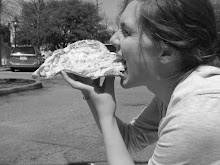All of the readings we have for this Wednesday I think brought up some ethical questions. It started with the beginning of the Telling True Stories section, specifically page 31 "I laugh at their jokes, whether I think they're funny or not." This came after a string of do's and don't's Isabel Wikerson came up with, and I know what she's saying and I may even agree with her, but I can't get the image out of my mind of someone being fake to get more information so they can turn around and write a negative profile. Like, someone makes a sexist joke, the interviewer laughs and then in the piece the person is portrayed as a sexist, and the part where the interviewer laughed (thus egging them on) isn't included and I think that's absolutely dishonest. It seems Wikerson may be trying to say to go along with what people are saying without inserting your own personality or interests and make the interviewee as comfortable as possible, but this is where I think things get blurry. It could go either way.
I mean, this whole class is based on this idea of truth or pieces of truth from a single perception that I have always picked apart in other settings. You can only get a little subjective piece of a person with a profile and that's that.
On to the actual narrative pieces: The American Man at Age Ten.
Hmm. Other than making me extremely nostalgic and missing my brothers and episodes of G.I. Joe, I found myself asking, "Why was this written?" Reading it in 2009 is fun in some ways, but I think it's fun in the same way that watching Kindergarten Cop every few years is fun. You get a couple good laughs in at the video game technology, the fashion, the icons (Schwarzenegger) but you don't watch it to get a deeper meaning out of anything. Also, I think if I picked up an issue of Esquire in the early 90s and read this story, I would think it was either cute or pointless. I like that she wanted to interview an oridinary kid instead of a celebrity, but I think this piece proves why people would rather read about celebrities. There's an abundance of 10-year-old boys who think stealing things from girls they call Maggot is flirting.
Trina and Trina was different. It was gripping, tragic, and frustrating. It also had that element of culture from the mid-90s, but it also had a clear and crazy-dramatic conflict. This is going to be a really fun piece to talk about, because I think Leblanc overstepped her boundaries at points, and I wonder how writing this story affected her relationship with Trina. It was gritty and disgusting in some parts, but I think it was true. Although I just wanted Trina admitted somewhere the whole time, I realize between her rebellion and bureacracy it wasn't as easy as Lifetime makes it seem sometimes. This is a great example of a piece where the author is present throughout, and I'm not sure I really liked the author that much. She wasn't awful, but she wasn't a likable character I was drawn to. It made it even more real. Oh! I remember what this reminds me of (of what this reminds me?). I read a bunch of stories like this my first year in a Prisons and Public Policy class. This is exactly how it is, people try rehab, they try starting over, but they always end up back on the streets doing what they know best. It's frustrating and tragic, but it's how these societies work. It's hard to get back in the system when you've spent so long staying out of it.
Subscribe to:
Post Comments (Atom)

Hey Marni, I liked reading your comments, especially what you said about the "Trina and Trina" piece. I'd like to hear more about where you think Leblanc overstepped her boundaries and why you found her to be an unlikeable character. I too questioned her role in the story, but ultimately found her endearing because of the explanation she forces into the tale. Looking forward to hearing more.
ReplyDeleteYour comment...
ReplyDelete"Like, someone makes a sexist joke, the interviewer laughs and then in the piece the person is portrayed as a sexist, and the part where the interviewer laughed (thus egging them on) isn't included and I think that's absolutely dishonest."
...is so well-thought, and well-said! I really love your critical analysis of what the author was saying; I hadn't thought of it like this!
Your analysis also makes me trust that whatever YOU write, it will be honest and genuine. I can't wait to see what you come up with.
You stumbled onto something here.
ReplyDeleteCute vs. Tragic.
What's the point of a story like "The American Man at Age Ten?" and Why do I like it so much?
What is the role of cute stories in journalism? Is there a place for profiles about 10-year-old ordinaries in our culture?
I hope so.
I'm biased, so I'll admit. When I first read "American Man" and "Trina and Trina" years ago, I loved Orlean's piece and didn't care for Leblanc's. When I re-read them recently, it was the same.
Why? At its simplest, Orlean's piece makes me smile; Leblanc's doesn't.